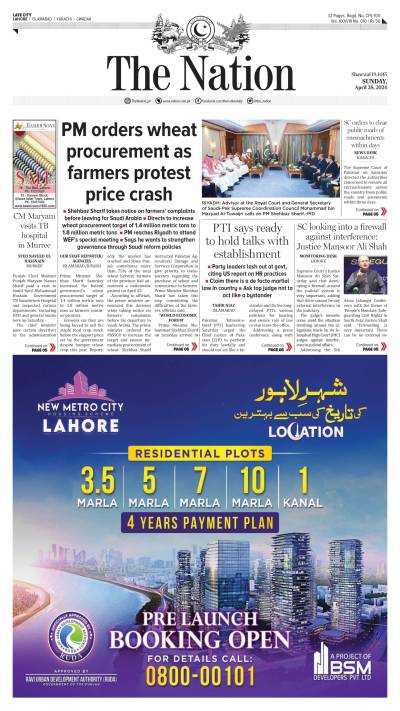The Federal budget for the next financial year was presented in the National Assembly by the Finance Minister Dr. Abdul Hafeez Sheikh. He looked untroubled by the vociferous slogans raised by members of the opposition. The budget speech could have been briefer by omitting some portions relating to the financial year which is now ending. He, however, did mention the agreement with the IMF through which a commitment of $ 11.i billion was made. The entire amount has not been released as Pakistan failed to implement its commitments. The Finance Minister however, fervently hoped that there will be no pressure on the balance of payments even if no further assistance was forthcoming from the IMF and other financial institutions. It was his pious hope that the current account will carry a nominal balance at the end of the financial year due to export earnings and remittances. The FBR is working hard on locating potentially new tax payers and at least 70,000 notices have been issued. As a result of imposition of GST and reforms in the tax collection machinery, the Finance Minister expected that the Board of Revenue will be able to meet the revenue collection target of Rs. 1952 billion. The Finance Minister assured the National Assembly that the budget deficit for the next financial year would be contained at Rs. 850 billion which would be equal to 4% of the GDP. Dr. Hafeez Sheikh expressed the pious hope that inflation would be brought down from the existing 15% to 9%. As regards the strategy incorporated in the development program, the Finance Minister informed the nation that emphasis will be placed on completion of ongoing schemes so that benefits could flow out to the people. Substantial allocation had been made for the infrastructure sector. Similarly provision had been made for water supply and irrigation schemes. An allocation of Rs. 495 billion had been made for meeting the essential needs of the defence forces. The Finance Minister expected that subsidies will be limited to Rs. 166 billion. These will be targeted subsidies. While presenting the budget for 2010-11 it was stated that the state owned enterprises would be re-structured. The Government has not lived to its promise. In his speech today, Dr. Hafeez Sheikh did not bring up the issue to losses inflicted by the Railways, PIA, Pak Steel and other Government owned bodies. The Prime Minister has repeated promised that independent boards will be constituted and the Chief Executive Officers chosen by the Board. However, It appears that the Government is unwilling to surrender this power and ensure transparency in the matter of promotions and appointments to other senior positions. GST has finally been imposed. It could not be reformed as was the hope of the IMF. However, the applicable rate has been brought down from 17 to 16%. Except for life saving drugs and food items everything else would be taxed at the above rate. The total taxation impact has been placed at Rs. 95 billion. It is difficult to state at this stage if this would please the IMF which appears to have been the moving spirit behind the budget formulation. As a sop to serving and retired government servants, pay and pension has been increased by 15%. There is also an increase in conveyance allowance for both defence forces and civilian officers in grade 1-15. Since inflation has stayed at 15% throughout the year, both serving and retired government servants do not stand to gain any real benefit from the increase. This increase will in any case be off set by increase in items of daily use on which GST has been imposed. Sugar has immediately registered an increase of Rs. 18 per kg. And so has tea. There is also an immediate reaction in respect of prices of drugs. As exemption on poultry feed has been withdrawn, there will be a sharp increase in the price of poultry and eggs. The new budget will administer a mortal blow to the lower income groups and the white collar workers. This budget is no different from the budgets that the Government has presented during the last three years. It lack vision and does not appear to focus on sectors that will promote employment and add to the GDP. If agriculture is the backbone of the economy, the budget fails to provide any special incentives for the growers. It was heartening to learn that no provision has been made for the devolved ministries. However, the budget estimates for the new financial year should an increase of 12 per cent over the current year. This requires some explanation. The fragile economy will show some signs of growth if the law and order situation is brought under control and the private sector is not squeezed out from obtaining bank credits. This can happen only if Government lives by its commitments.
Monday, April 29, 2024
Budget full of pious hopes

Lesco detects 75,276 power pilferers in 222 days
7:48 PM | April 28, 2024
PM Shehbaz calls for global health equity, climate resilience at WEF
7:47 PM | April 28, 2024
Foreign Minister Ishaq Dar appointed Pakistan's deputy prime minister
7:46 PM | April 28, 2024
Ashrafi vows to provide best facilities to Hajj pilgrims
7:45 PM | April 28, 2024
Security forces kill two terrorists in DI Khan
7:44 PM | April 28, 2024
Eyes On the PM
April 28, 2024
Track & Trace
April 28, 2024
Solar Siege
April 28, 2024
Political Tightropes
April 27, 2024
Wave of Revolution
April 27, 2024
Border security
April 28, 2024
Cinema – a Catalyst for Change
April 28, 2024
Korangi’s challenge
April 27, 2024
US double standard
April 27, 2024
Political turmoil
April 27, 2024
ePaper - Nawaiwaqt
Advertisement
Nawaiwaqt Group | Copyright © 2024





